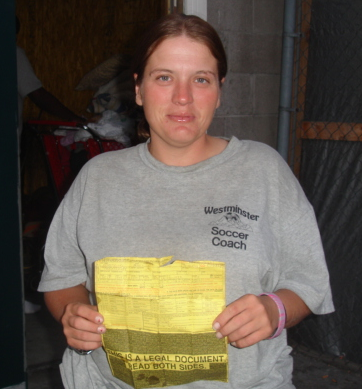
By Mary Ann West and Erik Lassi
DENVER -- The streets are filled with convention goers packing the restaurants, filling the venues, buying up the Obama souvenirs from both official and unofficial vendors. What you won't see, unless you are looking way beyond the chrome and glass, the newly painted walls and well stocked storefronts is the homeless population of the city. The sleek downtown skyline quickly gives way to a landscape that includes parking lots, industry space, pocket parks, single family homes, churches, homeless shelters and soup kitchens. Here is where the working class lives, yet a Condo Sale sign in front of a fenced parking lot announces homes will be available in the $200K to $2 million range.
Rumors have circulated for weeks that during the Democratic National Convention the homeless would be incarcerated or shipped out of the city. The incidents reported to us this week seem to corroborate that intimidation was part of the city's convention preparation, an approach to dealing with the city's homeless that aimed not to alleviate the problem or step up services and recovery programs but one that included paying the homeless to simply leave the downtown area during the day, sending them to movies, museums and the zoo. Homeless people and the city residents who know them reported witnessing police sweeps, roundups and confrontations meant to clear out the downtown neighborhoods.
Earlier this week, at the St Francis Center, a day spot for the homeless that provides service and counseling, about 30 people stood and sat along the brick wall waiting for the doors to open at 7:00 AM. Just ahead, people climbed into unmarked vans and cars wearing yellow traffic safety vests.
Asked to report on what was going on, people at the St Francis were eager to share their stories. They reported increased hassles with the police. They said they were often asked unannounced and for no reason to present identification. Some said they were simply told they could not be on the street and had to leave or they would be arrested.
Trojan Labor's Denise Barnes was deploying teams of day laborers out to construction sites and safety jobs. She mentioned that, recently, she's been struggling to find qualified workers to place in day jobs. A great majority of regulars have "disappeared," she says, some of them perhaps, she says, to the construction sites at INVESCO Field, where workers are preparing the sets for Barack Obama's acceptance speech tonight. Barnes confirms that the police have ratcheted up their actions this month, particularly checking IDs without cause.
Trojan owner Richard Parsons agreed. He said that roughly two weeks ago, he was standing in front of his small business with two co-workers, smoking mid-afternoon, when police cruisers rode up on the sidewalk on either side of the men. Asked what they were doing, Richard told the officers that he owned the business. They then demanded IDs and frisked the men before leaving. Around the same time Trojan had gathered people for a night construction job and the police arrived to tell workers they couldn't gather and wait there. Richard pointed out that he needs the police to be responsive, that the harassing keeps those who most need police protection from trusting the police when trouble arises. Trojan works with many of the city's hard pressed, providing jobs and training. Many people have worked as part of the Trojan labor force for years.
 A woman named Missy said she was arrested a week ago for loitering/trespassing while standing on a city sidewalk less then a block from the St Francis Center. Her summons says she has to appear in court on or before Labor Day. To fight the summons she would have to go through the court system. She would lose a day's pay.
A woman named Missy said she was arrested a week ago for loitering/trespassing while standing on a city sidewalk less then a block from the St Francis Center. Her summons says she has to appear in court on or before Labor Day. To fight the summons she would have to go through the court system. She would lose a day's pay.
By 7:00 AM police patrols are everywhere around the St Francis Center, marked cars going up and down the streets. In Confluence Park nearby, a man named Steve says he was harassed by the police. They drove their cars onto the basketball courts and scattered the men there and asked for Steve's ID. They handcuffed him to their car and later released him without charge. The park dwellers are wary of the police anyway, Steve said, partly because they say the police ran over two men sleeping in the park earlier in the month. The men survived. Steve said many of the park regulars had left or "disappeared" in recent weeks. With a sweep of his hand, he said that the park would normally be crowded. Today there were maybe a dozen people there.
Confluence Park is approximately 1,500 feet away from the Pepsi Center. It has long been a hang out/crash spot for homeless that don't/can't go into the shelters. Two homeless men who camp near Confluence said that at least 20 police officers on bikes, motorcycles and horses show up around 5:30 AM to roust people and get them moving away from the park; that a number of neighboring jurisdictions of Denver (Aurora, Englewood, Lakewood) are assisting in the sweeps; that people from Tent State had offered to pay them to camp at the Tent State site, an offer they refused.
The men detailed how officials in yellow shirts offer them incentives to clear out of the downtown area.
FIRST MAN: [In the morning] all they'll do is tell you to leave. "You better be outta here." "That's it."
[...]
SECOND MAN: They tell you to leave... What they'll do now, what they're doing through this convention thing, they give you tickets to go to a movie or go to the zoo or, up on Colorado Blvd there's a museum there, to get you away from all of this downtown.
FIRST MAN: Yeah. They offer you money.
SECOND MAN: Pretty much money, if you ask me.
FIRST MAN: Yeah-- the yellow jackets, right?
SECOND MAN: Yellow jackets.
FIRST MAN: That's what we call them, yellow jackets, the one's up by the mall. They walk up and go "Hey--
SECOND MAN: --Dude, I'll give you a ticket to a movie, a ticket to the theater, just get off the mall." Like, that was about a month ago.
FIRST MAN: Oh, it's happening right now. It happened yesterday.
SECOND MAN: Right now.
FIRST MAN: They want nobody on the mall, period. Period. Nobody on the mall.
A bike patrol moved through the park as we finished speaking.
ACLU-Denver Executive Director Catherine Hazouri said she was aware of rumors of police harassment but was not aware of any specific actions. She said there are ACLU volunteers out in the field on bikes riding around the city and that if anyone brought a rights issue to the organization, the ACLU would get involved.
Denver Police Commander Deborah Dilley, District 6, says flatly that the police do not, have not and will not tell people they can't go into certain areas of the city -- except for the areas around of the Pepsi Center and, today, the area of INVESCO Field due to security reasons. She says the police department has assigned two officers specifically to the homeless population and the department has held many community meetings to stress that the homeless have the same rights as everyone else. Commander Dilley said that an investigation was pending concerning the officer who ran over the homeless people in the park. Officers can't approach people without cause, but that people could be handcuffed for safety reasons and released without being charged or arrested. That was all legal procedure.
Jarene Petersen, a member of Denver's Street Collaborative, is part of a team organized to instruct homeless people in their rights. The Collaborative has three outreach workers on the streets seven days a week from 6:00 AM to 10:00 PM, reaching the most needy, those with mental illness, substance abuse problems and chronically homeless. Steet Collaborative recently held a voter registration drive and a church picnic. Shelters that normally close during the day have remained open with overflow capabilities while the Convention is taking place.
Denver's Road Home recently opened 55 apartment units for the homeless bringing the number of units to a total of 700 already occupied. The goal is 2,000 units within 10 years. Through the collective agencies, the goal is to provide services to help people through the sometimes numbing systems to find them housing, mental health and substance abuse programs, access to health care and the means to obtain identifications.

